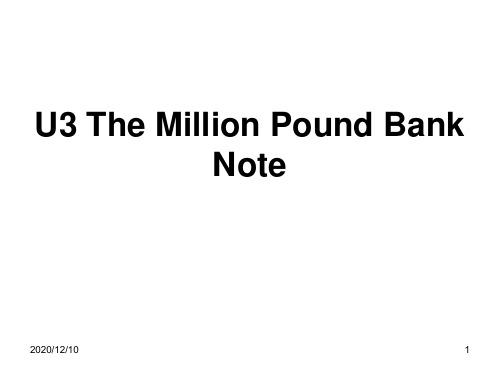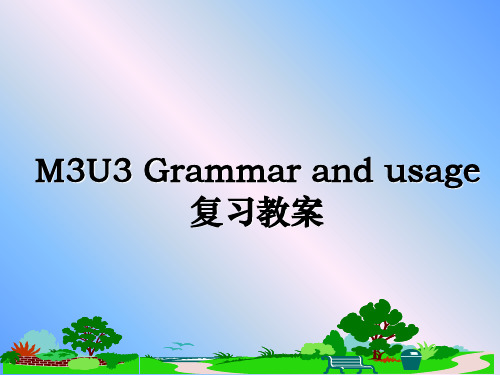M3U3 单词讲解
- 格式:pptx
- 大小:168.84 KB
- 文档页数:32

Module3 Unit3词汇、短语、句型及练习一、词汇9—全ancient[ ♏✋⏹☞☜⏹♦]adj. 古代的;古老的(P41, Welcome to the unit)9—全remain[❒✋❍♏✋⏹]link-v. & vi留下;被遗留;剩余;保持不变(P41, Welcome to the unit)object[ ♌♎✞✋♦]n.物体;客体,对象;目的,目标;宾语[☜♌♎✞♏♦]vi. 反对(to) (P41, Welcome to the unit)9—全similar[ ♦✋❍✋●☜☎❒✆]adj. 相似的;相仿的M9U3similarity[ ♦✋❍☯●✌❒☯♦✋]n.相似点,相像处;相似性(P42, A, Q2)M2U2bury[ ♌♏❒✋]vt.埋葬;埋藏(P42, Line11)M2U2surrounding[♦☜❒♋☺⏹♎✋☠]adj. 周围的,附近的(P42, Line10)M6U2surround[♦☜❒♋☺⏹♎]vt. 围绕,环绕;包围8—下discover[♎✋♦✈☜(❒)]vt.发现,发觉(P42, Line16)discovery[♎✋♦✈☜❒✋]n.发现treasure[ ♦❒♏✞☜]vt.珍惜,珍爱n. 金银财宝;财富(P42, Line17)cause[ ]n.原因,起因;理由,缘故;事业,(奋斗的)目标vt.造成,导致,使发生(P42, Line17)M2U2protection[☐❒☜♦♏☞⏹]n.保护(P42, Line17)protect[☐❒☜♦♏♦]vt.保护,防护9—全step[♦♦♏☐]n.步;脚步;步骤;台阶,梯级;阶段,进程vi.跨步,迈步;踩,踏(P42, Line20)M1U3figure[ ♐✋♑☯]n.体形;数字;人物(P43, Line25)9—全imagine[✋❍✌♎✞✋⏹]vt.想像;设想(P43, Line27)9—全gradually[ ♈❒✌♎✞☺☜●✋]adv.逐渐地;渐渐地(P43, Line33)M2U2explore[✋♦☐●]vt. & vi. 探索;勘探M2U3explorer[✋♦☐●❒☜]n.探险家(P43, Line37)historic[♒✋♦♦❒✋]adj.有历史意义的;历史的(P43, Reading strategy) M3U3historical[♒✋♦♦❒✋●]adj. 历史的;与历史研究相关的(P51, B, Line4) ☞historic “具有历史意义的” a historic novel一部有历史意义的小说;a historic event值得纪念的历史事件☞ historical “历史上发生过的” a historical novel一部历史小说;the historical event历史上确有其事的事件M4U3function[ ♐✈☠☞⏹]vi.起作用,正常运转n.作用,功能;职能(P46, A, Line2)heritage[ ♒♏❒✋♦✋♎✞]n.遗产,继承物;传统(P46, A, Line2)M9U2site[♦♋✋♦]n.(建筑物、城镇等的)地点,位置,建筑工地;现场,发生地,场所;网站,站点(P46, A, Line2)M2U2altogether[ ●♦☜♑♏❆☜]adv.总共(P46, A, Line3)9—全consider [ ☜⏹♦✋♎☜☎❒✆]vt.考虑;思考;认为(P46, A, Line4)M2U2extraordinary[✋♦♦❒♎⏹❒✋]adj. 意想不到的,奇怪的;不同寻常的(P46, A, Line4)valuabl e[ ✌●☺☜♌●]adj.宝贵的,珍贵的,贵重的value[ ✌●◆]n.价值vt.给……估价,给……评价;重视,珍视(P46, A, Line4)M6U3throughout[ ❒◆♋◆♦]prep. & adv. 各处,遍及;自始至终;贯穿整个时期(P47, B, Line4)8—下area[ ☪☜❒✋☜]n.地区,地域;领域,方面;面积(P47, B, Line6)M2U3companion[ ☜❍☐✌⏹✋☜⏹]n.伴侣;陪伴(P48)M1U1professor[☐❒☜♐♏♦☜]n.教授(P48)M1U1devote[♎✋☜☺♦]vt.致力于,献身M2U3devotion[♎✋☜☺☞⏹]n.奉献;忠诚;专心(P48)field[♐♓●♎]n.田,地;场地,运动场;领域;实地,野外(P48)M3U1sweat[♦♦♏♦]vi.流汗n.汗水(P48)8—上thirsty[ ☎❒✆♦♦✋]adj.渴的;口渴的(P48)M3U3unfortunate[✈⏹♐♦☯⏹☜♦]adj.不幸的,遗憾的M7U4unfortunately[✈⏹♐♦☞☜⏹☯♦●✋]adv. 遗憾地,不幸地,可惜地(P48) M2U1strength[♦♦❒♏☠]n. 力量,力气(P48)cotton[ ♦⏹]n.棉花;棉线,棉纱;棉制品(P49)M1U1sculpture[ ♦✈●☐♦☞☜]n.雕像,雕塑(P49)e xhibit [✋♑✋♌✋♦]vt.展览,展出;表现,显示(感情、品质或能力)exhibition[ ♏♦✋♌✋☞⏹]n.展览;展览品;(技能、感情、行为等的)表现,显示(P49)M2U3entrance[ ♏⏹♦❒☜⏹♦]n.入口;(俱乐部、社团、大学等)进入许可(P51, A, Line4)8—下enter[ ♏⏹♦☜(❒)]vt.进来,进去,进入;成为……的一员,加入;报名参加(考试、比赛等);登记,输入(姓名、号码等)(P51, A, Line7)passage[ ☐✌♦✋♎✞]n. (文章、讲话等的)一段,一节;通道;走廊(P51, A, Line7) 9—全solution[♦☜●◆☞☜⏹]n.解决办法,处理手段;答案,解,谜底(P51, A, Line13)M1U2sink[♦✋☠] (sank[♦✌☠], sunk[♦✈☠]) vi. 下沉,消沉n. 水池,洗碗池,水槽(P55, Line8)8—下board[♌(❒)♎]n.板,木板,甲板;(公司或其它机构的)董事会,委员会,理事会vt. & vi.上船(或火车、飞机、公共汽车等);(在学校或某人家里)寄宿(P55, Line8)①Passengers should board the train now.旅客现在该上火车了。



沪教版五年级上知识点总结M3U3 Seeing the doctor一.单词fever(n. 发烧)toothache(n. 拉链)cough(n. 咳嗽)cold(n. 感冒)medicine(n. 药)dentist(n. 牙医)either(ad. 也(否定))time(n. 时间(不可数),次数(可数))toothless(a. 没牙的)other(a. 其他的)hide(v. 躲,藏)themselves(反身代词. 他们自己)secret(n. 秘密)soon(很快)hurt(n./v./a. 受伤,疼痛)cave(n. 山洞)become(v. 变成,成为)二.词组1.感觉很好feel well2.你怎么了?What’s the matter with you?/What’s wrong with you?3.咳嗽have a cough4.发烧have a fever5.牙疼have a toothache6.看一眼have a look7.开会have a meeting8.吃一些药take some medicine9.别的什么… What else…10.休息have a rest11.没关系。
You’re welcome.12.需要/应该做should do13.在牙医所at the dentist’s14.对…有害be bad for15.提问频率(两种)How often 、How many times16.害怕做某事be afraid of doing sth./be afraid to do sth.17.有一个主意have an idea18.最好的食物the best food19.变得更好become better20.拔出pull out21.软饮料soft drink22.看医生see the doctor二.知识点1.have + a +某种病意为“生…病”➢have a fever/cough/cold 发烧/咳嗽/感冒➢have a toothache/headache/stomachache/earache 牙疼/头疼/胃疼/耳朵疼(器官+ache(疼痛))➢have a sore throat 喉咙疼➢其它一些have的词组:have a walk/picnic/meeting/rest2.secret用法➢n. 秘密➢常见词组:keep a secret 保守秘密➢secret + ary = secretary n. 秘书3.情态动词should(用法与情态动词can一样)➢should + 动词原形➢should本身无三单变化➢否定:should not(shouldn’t)+动词原形➢一般疑问句:Should …?(将should提前)肯定回答:Yes,…should.否定回答:No,…shouldn’t.e.g. You should do your homework now.You shouldn’t do your homework now.(否定)Should I do my homework now?(一般疑问句)4.feel用法➢*一般过去时:feel felt felt➢系动词:feel + a.(feel happy)➢feel —feeling n. 感受(可数)e.g. Ben feels well today. 本今天觉得很好。


牛津英语模块3unit3单词详解1.CivilizationIt is generally accepted that the Chinese civilization is one of the oldest in the world.普遍认为中国文化是世界最古老的文化之一Chinese civilization European civilization world civilization.2 lecture(1)n.演讲,讲课give/deliver a lecture to sb. on sth.关于某事进行演讲have a lecture 听演讲go to a lecture去听演讲The famous professor delivered a lecture on how to protect the environment.(2)v.作演讲,讲课Mr.Smith is lecturing on Russian literature3 take over接管In 89BC,the Romans took over Pompeii.Our chairman has left, so Peter will take over his job from him.我们的主席走了,彼特将接任他的工作.take sb. in欺骗take sth. in 理解etake on 呈现take off 起飞, 脱下take up占据,着手处理take charge take away 拿走take out 拿出take place take…for.. 把…误认为When did you take up Japanese as a second foreign language.你什么时间开始选修日语作为第二日语的?.3unfortunately 位于句首,作状语,用来修饰整个句子。
Luckily, frankly, obviously, exactly, honestly, generally, certainly, fortunatelyUnfortunately, all the people were buried alive after the vocalno erupted..不幸的是,火山爆发后所有的人都被活埋了.4bury (vt)埋葬,安葬,埋burial n 埋葬He was buried in his hometown.他被埋葬在他的故乡The house was buried under snow.房子被埋在雪下.be buried in =bury oneself in 埋头于…,专心于…Jean always buried himself in his work.简总是埋头工作。
Module3 Unit3一、核心词汇1. fever发烧2. toothache牙痛3. cough咳嗽4.cold 感冒5.well 形容身体状况良好6.medicine药物二、词汇解释1) cough(咳嗽),fever〔发热〕,cold (感冒),toothache〔牙痛〕都是表示疾病的名词,表示“生病〞常用动词have。
表示疾病的名词前通常要加a。
①他咳嗽发烧。
He has a cough and has a fever.②我牙疼。
I have a toothache.2) medicine的意思是药,是不可数名词,表示“吃药〞用动词take。
你必须吃药。
You must take some medicine.3) well和better都是用来形容身体状况的形容词。
①我今天感觉身体不适。
I don’t feel well today.②我感觉身体好多了。
I feel better toady.{拓展} well还可以作副词修饰动词,意思是“好〞。
①他篮球打得好。
He play basketball well .4) soft drinks是指不含酒精成份的饮料,如可乐、果汁。
5) lunch的意思是“午饭〞,它和breakfast (早饭),supper(晚饭),dinner〔晚饭;正餐〕是同类词。
{注意} dinner 是“正餐〞的意思,通常指晚上家里人在一起吃饭的那顿饭,所以,dinner 也有“晚餐〞的意思。
6) king和emperor是近义词,king的意思是“国王〞,emperor是“皇帝〞的意思。
7) 由tooth“牙齿〞+less“ 较少的〞构成toothless,toothless的意思是“无牙的〞。
{注意} tooth(牙齿)是可数名词,复数形式是teeth。
四、本课重点本课复习情态动词should的用法。
should的意思是“应该〞,它的用法和我们学过的must一样,后面直接用动词原形。
1.take place=happen2.play a role in在…发挥作用=play a part in3.keyn.钥匙;(打字机等的)键;关键,线索,秘诀;(音乐的)调adj.关键的;主要的a key causea key to …attitude to4.researchn.研究,调查;探索do research onvi.做研究;探究;5.announce宣布;述说;声称;She was planning to announce her engagement to Peter她正计划宣布她和彼得订婚一事announce更接近于汉语“公布”、“告知”的意思,declare含有庄严宣告或交代清楚的意思,declare war against distant:冷漠的,遥远的Distancein the distanceat a distance offrom a distanceappear=show up=turn updisappear appearance:explain----explanation explain to sb. sth.=explain sth. to sb6.doubt:n/v怀疑no doubt 无疑,确实He’s made some great movies and there’s no doubt about it.他拍了一些非常出色的影片。
这一点是毫无疑问的。
There is some doubt about/of /whetherThere is no doubt thatIn doubt 怀疑,不确定Cast doubt on对…产生怀疑Without doubt=beyond doubt=no doubt毋庸置疑7.resultResult in 导致=lead to=cause =bring about=contribute to Result from:由于As a result ofHave an influence on=have an effect on=affectDie ofDie from8.rise up against起义,反抗The slaves rose up against their cruel mastersrise against 起来反抗rise up:起床,耸立,上升,起来造反Gazing at the distant view, we saw mountains rise straight up.9.take…back收回,撤回,归还,(使)返回If that’s the case, you cantake back your words. Take after :将…作为榜样跟随Take apart:拆开Take down:计下,放下Take …for:把…视作Take…in:让…进入,接纳,吸收Take off:脱掉(衣服等),走开,起飞,休假Take up:举起,升起,用尽,耗掉,或者占用Take effect:生效Take root:确定下来,固定下来,(植物)扎根stand in one’s path 阻碍(某人)=stand in one’s waye.g. No one can stand in my path.没有人可以阻碍我。